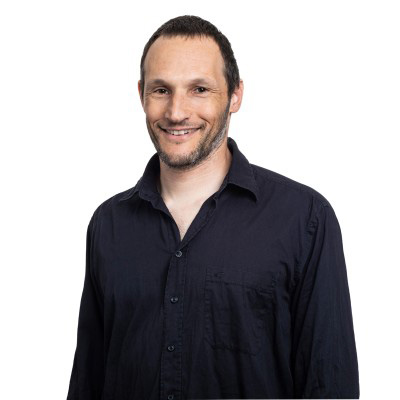FOOD TECH on the menu
Weizmann alumni are making their mark on Israel’s thriving food-tech sector—boosting nutritional value and finding alternative, sustainable food sources
Alumni

How does an expert in nanomaterials wind up working on a sugar-reduction solution in Israel’s flourishing foodtech sector? It might not seem like an intuitive move, but to Dr. David Tsivion, CTO of DouxMatok, it makes perfect sense. Dr. Tsivion earned his PhD at the Weizmann Institute in 2013 under the supervision of Prof. Ernesto Joselevich in the Department of Materials and Interfaces (now the Department of Molecular Chemistry and Materials Science). “Food is material,” he explains, noting that food is comprised of different materials—emulsions, particles—and the food-tech sector incorporates materials science, chemistry, and food science.
Staying true to his Weizmann roots, Dr. Tsivion embraces multidisciplinary research and says that it was the multidisciplinary aspect of DouxMatok’s sugarreduction product, as well as the scientific challenge of producing it, that drew him to the company.

Dr. Ilan Samish

Dr. David Tsivion

Dr. Jonathan Caspi

Dr. Daphna Heffetz
Incredible sugar
The technology developed by the Petah Tikva-based DouxMatok reduces the amount of sugar consumed without defaulting to sugar substitutes, most of which have an unpleasant taste, as well as adverse effects on our bodies, as seen in recent studies by Prof. Eran Elinav from the Institute’s Department of Systems Immunology, which provided the first evidence that artificial sweeteners can in fact alter people’s gut microbiomes, affecting blood sugar levels. Instead, the company’s Incredo® Sugar adds a molecule to natural cane or beet sugar that “moves” more sugar to a person’s saliva, causing the body to think it’s tasting more sugar than it actually is.
The company’s original technology, developed by the late Prof. Avraham Baniel in 2013, used silica—a micron-sized material with nano-sized features that has been widely used in food products for decades and is approved all over the world—but consumers resisted the concept of added silica molecules. Food producers now prefer to launch new products that are “clean label,” regardless of how many existing products contain silica.
DouxMatok rose to the challenge and developed a proprietary method that uses a different natural molecule that serves the same function as silica—providing the taste of sugar while reducing the amount of sugar consumed by 30%- 50%. The Incredo Sugar technology works best for solid foods like chocolate, baked goods, and sweet spreads, so it won’t be replacing the 10 spoons of sugar in a can of Coke anytime soon, but its development was still a breakthrough worthy of being featured on an episode of the Netflix hit series, “Explained.”
Food is a highly emotional issue for consumers, Dr. Tsivion says, adding that as all new food products are subject to stringent regulation and testing before they hit the shelves, the global food sector is “naturally conservative.” Moreover, the belief that “natural” equals “good” is becoming increasingly prevalent, flawed as that equation might be.
“Natural is not necessarily healthy, and technology can be a solution,” he stresses. When asked what makes the Weizmann Institute unique, Dr. Tsivion says that “Excellence is in its DNA. When you walk through the main gate, it’s like entering an elite parallel universe, in the best sense. Everything at Weizmann is on the highest level—from the nursery schools to the gardening to the research. Weizmann excels at everything it does.”
Pretty sweet
Dr. Ilan Samish, founder and CEO of Amai Proteins, located in Rehovot a stone’s throw away from the Weizmann campus, has a unique perspective on life and science. He earned both his MSc and PhD in biochemistry at the Institute, studying proteins in the lab of Prof. Avigdor Scherz, a renowned biochemist he calls an “artist.”
Dr. Samish also spent years as a lecturer at the Davidson Institute for Science Education, as well as covering scientific topics as a speaker and journalist for some of the biggest media outlets in Israel. He is passionate about making science accessible to the public.
As a postdoctoral fellow at the University of Pennsylvania, Dr. Samish devoted himself to computational protein design. He wrote a textbook on the subject in 2016, and in 2004 founded 3Dsig, the leading annual conference in structural bioinformatics and computational biophysics, which he co-chaired for 12 years.
His company, Amai Proteins (“amai” means “sweet” in Japanese), reproduces an intensely sweet protein inspired by the “serendipity berry” (Dioscoreophyllum volkensii)—a rare Central African jungle fruit. Animals are attracted to its sweet flavor, snack on the fruit, and pass the seeds as they meander through the jungle. Some seeds take root and grow, making the plant’s sweetness an integral component of its survival.
Jungle animals aren’t the only creatures with a sweet tooth—many of us overindulge. Dr. Samish believes that overconsumption of sugar is the number one public health problem of our time, going so far as to compare processed sugar to heroin. “They’re both white powders that bring people pleasure,” he says.
But harvesting or growing serendipity berries as an alternative to sugar cane or beets is not financially or environmentally feasible. Instead, Amai Proteins uses Agile-Integrative Computation Protein Design, precision fermentation production, and food technology capabilities, to produce its flagship product, Sweelin™. A “quick” amino acid design followed by a fermentation process results in dry white powder protein, which as a ground-up sweetener can replace as much as 70% of added sugar in foods such as ketchup, peanut butter, spreads, and juice without affecting their taste or triggering insulin in the body.
As Dr. Samish explains, the Sweelin Designer Protein is 50 degrees more stable than the monellin protein found in the wild, making it functional for the mass food market. Because the product is over 3,000 times sweeter than sugar, it is also more cost-effective in terms of units, because so much less of it is needed.
The advantages of his company’s product go beyond the health benefits of reduced sugar consumption. Sugar cane and sugar beet crops are enormous drains on agricultural land and water resources and require the use of pesticides and herbicides; to say nothing of the fact that transporting 180 million tons of sugar to market worldwide annually creates a giant carbon footprint. Even a 1% reduction in global sugar production would save 2.5 trillion liters of water and free up 6.5 million acres of farmland.
In 2022, Amai Proteins won the prestigious Extreme Tech Challenge (XTC) competition, becoming the first food-tech venture to take the Global Winner crown. Sweelin is digestible and non-allergenic, and the company is in the process of securing Generally Recognized as Safe (GRAS) regulatory clearance from the FDA. Rather than sell Sweelin directly to consumers, the company is aiming for the business-to-business market in the belief that it can have a greater impact by slashing the sugar content of processed food. They are already in talks with some of the biggest international food corporations—including PepsiCo, Danone, Mars Wrigley, and Ocean Spray–who are desperate to reduce the amount of sugar in their products without compromising on flavor.
As for concerns that the company’s disruptive technology will leave a void in impoverished sugar-growing regions, such as Mexico—it turns out that not all sugar production needs to stop. Amai Proteins will be able to scale its technology thanks to precision fermentation, a process that produces specific organic molecules by genetically altering microorganisms, and like all fermentation, this requires fuel in the form of sugar. The company plans to set up large-scale fermentation facilities near sugar-growing sites, eliminating the risk of sugar crops being replaced by something much less savory.
Dr. Samish is not the only Weizmann alumnus at Amai Proteins. The company’s Director of Computational Protein Design Dr. Naama Kopelman, Director of Clinical and Regulatory Affairs Dr. Yael Lifshitz, and Application Manager Marina Kashdan all earned graduate degrees at Weizmann.
Amai Proteins is also utilizing tools and expertise at the Institute’s Nancy and Stephen Grand Israel National Center for Personalized Medicine (G-INCPM), the Dana and Yossie Hollander Center for Structural Proteomics, and the Protein Analysis Unit, a few of the key life sciences facilities that are working with the company under an umbrella collaboration agreement—a hallmark of Weizmann research.
Dr. Samish laments the relative lack of activity to reduce sugar content in food. “There isn’t enough competition,” he says.
Dr. Tsivion of DouxMatok agrees, saying, “When there are more players in a given ecosystem, there is more ‘cross-pollination,’ which inspires different players to push each other forward.”

Clean tuna
Dr. Daphna Heffetz, co-founder and CEO of Wanda Fish, a food-tech startup cooperating with Tufts University in Boston, Massachusetts, to develop cultivated whole fish fillets, completed a PhD in biochemistry at the Weizmann Institute under the supervision of Prof. Yehiel Zick. She stayed on for a postdoc in molecular biology and says her academic goal had always been to study at the Weizmann Institute.
Food tech is a new field for Dr. Heffetz, who has spent over 25 years in the medical technology sector, founding and managing several successful companies including Savyon Diagnostics, TransPharma Medical, and PhytoTech Therapeutics. She might never have made the jump to food if Israel’s Kitchen FoodTech Hub accelerator hadn’t approached her about developing cultivated fish fillets.
Until she began to research the idea, Dr. Heffetz says, she had not been aware of the devastating state of the world’s oceans, especially in terms of pollution, which fish ingest and pass on to the people who consume them.
The sustainability aspect of the project appealed to her, and she hasn’t looked back.
“I’m so thankful I started,” she says.
Based in Tel Aviv, Wanda Fish is developing a premium product—whole-cut fish fillets cultivated from fish muscle and fat cells, grown in bioreactors. The company tested several cell lines and decided on bluefin tuna fillets as its flagship product. The most expensive fish in the world, bluefin tuna are delicious and highly nutritious, but are also severely overfished and one of the ocean species most affected by pollution. Compared to most species of fish, tuna is also extremely challenging to cultivate.
Like most ideas for cultivated proteins—as opposed to plant-based substitutes—concepts for cultivated fish have run up against technical difficulties, as well as the problem of how to fully scale up production and reach cost parity. If those goals remain elusive, lab-grown fish fillets will not be commercially viable.
While several companies are working on pulverized cultivated fish substitutes, only a few are developing grill-ready whole fillets. If Wanda Fish achieves its goals, its fillets will have the same taste, texture profiles, and nutritional value as fish extracted from the oceans in traditional ways—minus the mercury and other pollutants.
In the initial stages, engineering fish fillets is more complicated than lab-grown meat technology—another hot field in Israel’s food-tech scene—simply because “we don’t know a lot about fish biology,” Dr. Heffetz explains. Most work on cultivated proteins has used mammalian cells, and there are almost no tools with which to characterize types of fish cells. However, Dr. Heffetz says, it appears that once the initial technical hurdles are overcome, it will be easier to produce cultivated fish fillets than cultivated cuts of meat.
Furthermore, as fish are wild and naturally deal with tough conditions and temperature changes, bioreactors for growing fish fillets don’t need to be as precise as the ones used for lab-grown meat, making them less costly to operate.
How does the food-tech sector compare to med-tech? It’s hard to compare the two, Dr. Heffetz says, adding that the “deep tech” processes of food tech—as opposed to developing plant-based alternative ingredients—appeal to her love of technology. Of course, food products, while subject to stringent regulation, do not have to undergo clinical trials, making the development process shorter. Dr. Heffetz says that the US Food and Drug Administration (FDA) and the US Department of Agriculture will share regulatory responsibilities for cultivated meat, whereas cultivated fish will be subject to FDA scrutiny only. As for her time in Rehovot, when asked what makes the Weizmann Institute unique, Dr. Heffetz says she was “charmed” by the atmosphere, as well as the high level of science, making it “an ideal place to study.”

A compromise for carnivores
Dr. Jonathan Caspi, who earned both his MSc and PhD degrees at the Weizmann Institute, is Vice President of Research and Development at Mush Foods, a startup seeking to reduce meat consumption by producing an alternative protein product based on mushroom mycelia.
Mush Foods, founded by CEO Shalom Daniel, offers an intriguing compromise for meat lovers who are unlikely to adopt fully plantbased alt-hamburgers. The company uses not mushrooms themselves (“Mushrooms cost more than meat nowadays,” Dr. Caspi says) but rather mushroom mycelia—a rootlike structure of threads that grows underneath mushrooms—to replace as much as 50% of meat content in commonly consumed foods. The mycelia are grown in specially constructed rooms, where temperatures and gas content are all carefully monitored. It takes only eight to 10 days to grow a mycelium big enough to be harvested for use.
Dr. Caspi also points out that in addition to reducing the macro amount of meat consumed—and thereby the agricultural resources and water that would have been used to grow the animals slaughtered— the mushroom mycelia reduce the fat and cholesterol intake. “Mushrooms [or mushroom products] are a complete amino acid profile, similar to that of meat,” he says.
Mush Foods’ product also boosts nutritional content by adding vitamins, minerals, and fiber, not to mention providing a viable alternative protein to keep the world’s expanding population fed as climate change wreaks havoc on the kinds of crops that can be raised in annually climbing temperatures.
The scientific challenge of developing the mushroom-based solution was part of what attracted Dr. Caspi to Mush Foods after he worked for two different Israeli cultured meat companies.
Dr. Caspi made the move to mushrooms partly to advance in his career and partly because he believes that the mushroom solution can be adopted in a “reasonable time frame,” unlike cultured meat, which he expects could take as long as a decade to become widely enough used to make a difference. Alternative protein is a deeply personal issue for Dr. Caspi. “If I wasn’t a scientist, I would probably be doing something related to healthy lifestyles and healthy eating. That’s my passion,” he says, noting that he follows a whole-food, plantbased diet. “If everyone ate like I do, this field [alt-proteins] would be unnecessary,” he adds.
In Dr. Caspi’s opinion, part of what makes the Weizmann Institute special is the “freedom to focus almost exclusively on research.” He earned his master’s degree in molecular genetics under the supervision of Prof. Shmuel Pietrokovski, and his PhD in biochemistry and Prof. Ed Bayer. Looking back on this experience, Dr. Caspi says he appreciates the generous support—social and financial—Weizmann provides to students; the encouragement from faculty; and the possibilities the Institute offers for academic cooperation. He also likes that graduate study focuses on actual, hands-on research in a laboratory setting, instead of strictly theoretical coursework. In short, he calls the Weizmann Institute “an accelerator for young scientists.”









